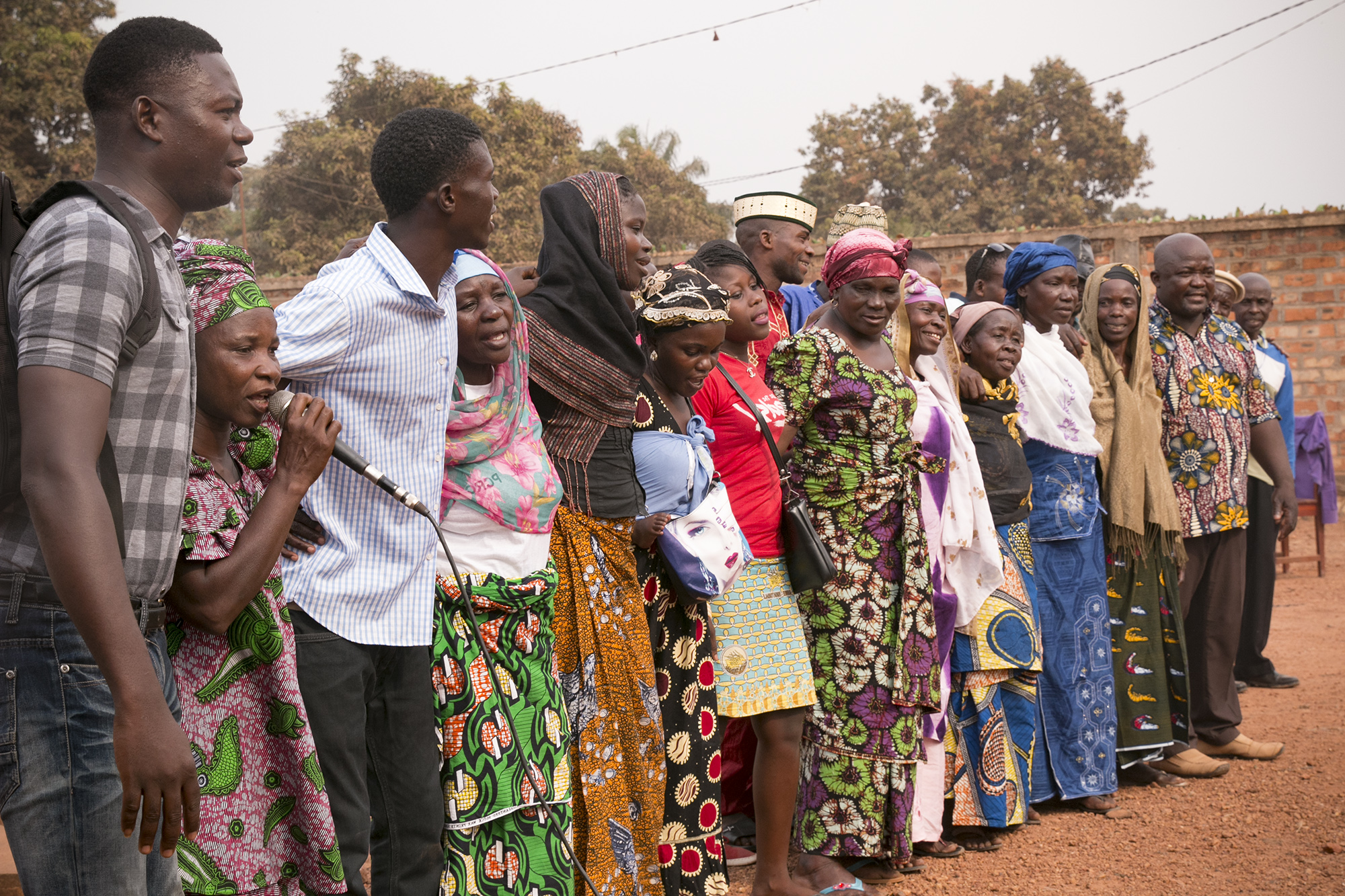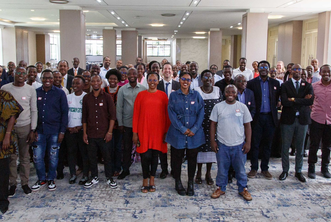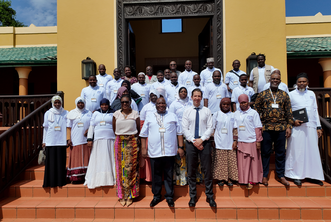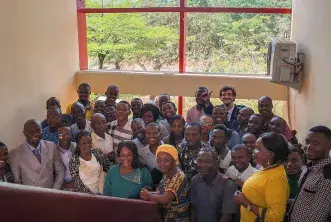Nuestro trabajo en la República Centroafricana

La República Centroafricana ha experimentado un aumento de la violencia desde marzo de 2013. Con casi 900.000 personas desplazadas forzosamente desde esa fecha, la crisis se ha convertido en uno de los peores desastres humanitarios de nuestro tiempo, según informes de la ONU. Hay más de 460.000 refugiados de la República Centroafricana en los países vecinos y 436.000 son desplazados internos. La división intrarreligiosa e interreligiosa afecta a la estabilidad del país, provocando enfrentamientos entre diferentes comunidades religiosas y comunidades étnicas, y debilitando el potencial de reconciliación.
Debido a la magnitud de este desplazamiento, el país corre el riesgo de dividirse entre un norte musulmán y un sur cristiano. Según diversas fuentes, los cristianos representan el 80% de la población (55% protestantes, 25% católicos) y los musulmanes aproximadamente el 15%.
La Conferencia del Foro de Bangui sobre Reconciliación Nacional fue organizada en mayo de 2015 por el gobierno de transición que condujo a la adopción del Pacto Republicano por la Paz y la Reconciliación. En octubre de 2015, el Consejo de Seguridad de la ONU llamó "a la comunidad internacional a continuar apoyando a la República Centroafricana al abordar prioridades críticas articuladas por los centroafricanos durante el Foro de Bangui sobre Reconciliación Nacional" y "elogió la acción conjunta de líderes religiosos en la República Centroafricana en la búsqueda de paz intercomunal ". Por lo tanto, es imperativo que los actores internacionales y locales continúen apoyando el diálogo, incluso entre los líderes religiosos para allanar el camino hacia la paz y la reconciliación.
El KAICIID tiene como objetivo fomentar un entorno en el que los actores religiosos trabajen juntos en la generación de confianza para la reconciliación y la paz a través de:
1. Un establecimiento de mecanismos inclusivos que fortalezcan la capacidad de los líderes de la comunidad religiosa de la República Centroafricana para interactuar exitosamente entre sí, incluyendo un mecanismo de alerta temprana para monitorear, mitigar y prevenir la violencia interreligiosa en las áreas de conflicto.
2. Un desarrollo de la capacidad de los actores religiosos para llevar a cabo iniciativas interreligiosas. Esto incluye el entrenamiento de líderes musulmanes para la futura cooperación intergrupal con líderes cristianos.
3. La implementación de iniciativas piloto en áreas en riesgo de conflicto, en asociación con los miembros de la Plataforma interconfesional existente.
4. La disposición de apoyo técnico y financiero a la Plataforma interconfesional para coordinar las actividades de sus miembros. Se ha llevado a cabo un estudio de evaluación de las necesidades para identificar los problemas e identificar los vacíos que deben abordarse en el futuro.
· Se adoptó el Plan de Acción de Viena para promover el diálogo interreligioso, que fue apoyado por representantes de las comunidades musulmanas y cristianas, así como de varios gobiernos. Los imanes que representan a los dos principales grupos musulmanes acordaron unirse y trabajar junto a los cristianos por la paz, lo que constituye un primer paso para abordar el tema del liderazgo dentro de su comunidad.
· Sensibilización a través de espectáculos teatrales participativos y programas de juegos públicos (vistos por aproximadamente 16.100 personas), partidos de fútbol con equipos mixtos cristianos y musulmanes (vistos por aproximadamente 2.200 personas), conciertos de canciones religiosas y eventos de intercambio cultural promoviendo la paz y la cohesión social.
· Desarrollo de un módulo de capacitación para líderes religiosos, promoviendo la resolución pacífica de conflictos utilizando textos religiosos cristianos y musulmanes como herramientas para interacciones pacíficas entre diferentes comunidades de fe.
· 120 líderes cristianos y musulmanes religiosos y comunitarios formados en diálogo interreligioso para la paz y la reconciliación.
· Apoyar los esfuerzos de defensa del diálogo interreligioso a través de la implementación de varios Proyectos de Impacto rápido en asociación con los tres líderes religiosos de la Plataforma interreligiosa.
· Creación de un Manual de facilitación de Diálogo para la capacitación de formadores específico para la RCA
· 90 líderes comunitarios jóvenes y mujeres capacitados como formadores en la facilitación del diálogo intercomunal.
Finn Church Aid (FCA), en nombre de la Red para Pacificadores Religiosos y Tradicionales
El papel de los líderes religiosos para lograr la paz en el país es crucial, dada su capacidad para impulsar los esfuerzos nacionales de reconciliación desde el interior de sus respectivas comunidades. Con este fin, el KAICIID impulsa el establecimiento de mecanismos operacionales y sostenibles para fortalecer la capacidad de los líderes religiosos (con un enfoque inicial en la comunidad musulmana) en la prevención de la violencia y el establecimiento de un diálogo interreligioso para la reconciliación.



![[file:field-file-image-alt-text]](/sites/default/files/styles/project_image/public/factsheet_-_summer_2015_sp.jpg.webp?itok=ZAF1w_Rn)
![[file:field-file-image-alt-text]](/sites/default/files/styles/project_image/public/annual_report_2013-2014.png.webp?itok=e7qhx3OV)
![KAICIID and partners deliver a presentation at the English Club at the U.S. Embassy Bangui about peacebuilding through interreligious dialogue and getting to know the Other. Photo: KAICIID [file:field-file-image-alt-text]](/sites/default/files/presentation_to_english_club_at_us_embassy_in_bangui_-_20_2.jpg)
![Imam Tijani is one of the Central African Republic’s most influential religious leaders, and he supports the Vienna Intra-Muslim Dialogue Conference at KAICIID. Photo: KAICIID [file:field-file-image-alt-text]](/sites/default/files/imam_tijani_-_2.jpg)
![Imam Tijani with KAICIID staff and partners at the Central Mosque in Bangui, PK5, where the Imam had welcomed Pope Francis in November 2015. Photo: KAICIID [file:field-file-image-alt-text]](/sites/default/files/imam_tijani_-_10.jpg)
![Children are the future. We take time to answer their questions. This child approached us during our visit to the Central Mosque. It was unusual for him to see a man dressed in a suit, and he wondered what we were doing there. Photo: KAICIID [file:field-file-image-alt-text]](/sites/default/files/me_w_child_at_central_mosque_.jpg)
![In the Central African Republic, they count kilometers outwards starting from kilometer zero, and that is how they name their districts. This district is 5 kilometers out from kilometer zero, and therefore this it is called PK-5. Photo: KAICIID [file:field-file-image-alt-text]](/sites/default/files/pk5.jpg)
![KAICIID values female and youth representation in the peacebuilding process. We had a fruitful discussion with members of the Muslim Women’s Association and the local community in the Central African Republic. Photo: KAICIID [file:field-file-image-alt-text]](/sites/default/files/meeting_with_members_of_pk5_community_-_7.jpg)
![To have more sustainable results, women must be included in the dialogue; the Muslim Women’s Association in the Central African Republic with KAICIID and partners, along with representatives of the local community. Photo: KAICIID [file:field-file-image-alt-text]](/sites/default/files/meeting_with_members_of_pk5_community_-_18.jpg)
![KAICIID Country Program Manager Agustin Nunez delivers a lecture on tolerance and coexistence to students at the University of Bangui. Photo: KAICIID [file:field-file-image-alt-text]](/sites/default/files/uni_of_bangui_-_9.jpg)
![The students at the University in Bangui were genuinely interested in gaining skills in interreligious dialogue and peacebuilding to make a difference in their communities and to achieve peaceful coexistence. Photo: KAICIID [file:field-file-image-alt-text]](/sites/default/files/uni_of_bangui_-_12.jpg)
![KAICIID and partners with students from the University of Bangui after a delivering a lecture on understanding differences and finding common values for the sake of social cohesion and living without conflict. Photo: KAICIID [file:field-file-image-alt-text]](/sites/default/files/uni_of_bangui_-_13.jpg)
![The French Ambassador to CAR expressed his support to KAICIID and partners in bringing the peacemakers to the dialogue table in the Vienna Intra-Muslim Dialogue Conference taking place at KAICIID Headquarters 25-26 February 2016. Photo: KAICIID [file:field-file-image-alt-text]](/sites/default/files/meeting_with_franch_ambassador_-_5.jpg)
![KAICIID's Agustin Nunez and partner Mohamed Elsanousi behind the scenes during a Radio interview about the importance of interreligious dialogue in increasing social cohesion and peaceful coexistence. Photo: KAICIID [file:field-file-image-alt-text]](/sites/default/files/radio_interview_-_4.jpg)
![We had the opportunity to meet with the American Ambassador to the Central African Republic, Jeffrey J. Hawkins Jr. Photo: KAICIID [file:field-file-image-alt-text]](/sites/default/files/meeting_with_us_ambassador_.jpg)
![Working with the technical committee to finalize the logistical plan for the Vienna Intra-Muslim Dialogue Conference. Photo: KAICIID [file:field-file-image-alt-text]](/sites/default/files/technical_committee_meeting.jpg)
![KAICIID staff and partners met the archbishop of the Central African Republic to discuss plans for peacebuilding in the region, starting with intra-Muslim dialogue to enhance social cohesion among the Muslim community. Photo: KAICIID [file:field-file-image-alt-text]](/sites/default/files/meeting_with_archbishop_-_3.jpg)
![The Christian community in the Central African Republic wishes to see their brothers and sisters in the Muslim community find greater unity. The archbishop of the Central African Republic is looking forward to attending the Vienna dialogue. Photo: KAICIID [file:field-file-image-alt-text]](/sites/default/files/meeting_with_archbishop_-_5.jpg)
![Catalyzing interreligious dialogue by supporting existing structures in the field is in line with KAICIID’s strategy. During our visit to the Central African Republic, we met with Catholic Relief Services and discussed future collaboration. Photo: KAICIID [file:field-file-image-alt-text]](/sites/default/files/meeting_at_crs_-_2.jpg)
![KAICIID met with UN Women in the Central African Republic to discuss female representation in the peacebuilding process. Photo: KAICIID [file:field-file-image-alt-text]](/sites/default/files/meeting_at_un_women.jpg)
![During KAICIID’s visit to the Central African Republic, we met the Minister of Reconciliation to discuss the way forward in panning for the Vienna Intra-Muslim Dialogue Conference. Photo: KAICIID [file:field-file-image-alt-text]](/sites/default/files/meeting_with_minister_of_reconcilitation_-_2.jpg)
![During KAICIID’s visit to the Central African Republic, we stopped over to visit our MoU Partner, UNDP, to talk about possible avenues for future cooperation in the region. Photo: KAICIID [file:field-file-image-alt-text]](/sites/default/files/meeting_at_undp.jpg)
![[file:field-file-image-alt-text]](/sites/default/files/img_9574.jpg)
![[file:field-file-image-alt-text]](/sites/default/files/car_dialogue_kaiciid_02252016.jpg)
![[file:field-file-image-alt-text]](/sites/default/files/img_9550.jpg)
![[file:field-file-image-alt-text]](/sites/default/files/img_9566_2.jpg)
![[file:field-file-image-alt-text]](/sites/default/files/car_dialogue_kaiciid_02252016064.jpg)
![[file:field-file-image-alt-text]](/sites/default/files/car_dialogue_kaiciid_02252016007_0.jpg)
![[file:field-file-image-alt-text]](/sites/default/files/car_dialogue_kaiciid_02252016004_2.jpg)
![[file:field-file-image-alt-text]](/sites/default/files/car_dialogue_kaiciid_02252016003.jpg)
![[file:field-file-image-alt-text]](/sites/default/files/car_dialogue_kaiciid_02252016001.jpg)